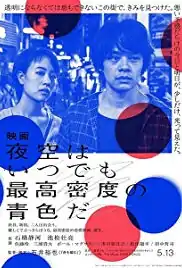The Tokyo Night Sky Is Always the Densest Shade of Blue
The Tokyo Night Sky Is Always the Densest Shade of Blue (Japanese: 夜空はいつでも最高密度の青色だ, Hepburn: Yozora wa itsu demo saikō mitsudo no aoiro da)[1] is a 2017 Japanese romantic drama[2] film directed by Yuya Ishii.[3] It is based on a book of poetry of the same name written by Tahi Saihate and published in 2016.[4]
| The Tokyo Night Sky Is Always the Densest Shade of Blue | |
|---|---|
 Japanese theatrical poster | |
| Directed by | Yuya Ishii |
| Screenplay by | Yuya Ishii |
| Based on | Tahi Saihate |
| Starring | Shizuka Ishibashi Sosuke Ikematsu Tetsushi Tanaka Ryuhei Matsuda Paul Magsalin Mikako Ichikawa Ryo Sato (actor) Takahiro Miura |
| Music by | Takashi Watanabe |
| Cinematography | Yoichi Kamakari |
| Edited by | Shinichi Fushima |
Production company | Little More Film-Makers |
| Distributed by | TV Tokyo |
Release date |
|
Running time | 108 minutes |
| Country | Japan |
| Language | Japanese |
The film premiered at the 2017 Berlin Film Festival.[3][1] It features the song "New World" by The Mirraz.[5]
Plot
The Tokyo Night Sky Is Always the Densest Shade of Blue follows the relationship between two young adults, half-blind construction worker Shinji[2] and nurse-cum-bartender Mika.[3]
Cast
- Shizuka Ishibashi as Mika
- Sosuke Ikematsu as Shinji[1]
- Tetsushi Tanaka
- Ryuhei Matsuda
- Paul Magsalin
- Mikako Ichikawa
- Ryo Sato
- Takahiro Miura
Reception
Reviewing the film after its showing at the Berlin Film Festival, The Hollywood Reporter's Deborah Young called The Tokyo Night Sky... "an earnest, at times poetic, drama about teen alienation".[3] Writing for the South China Morning Post, James Marsh said the film "sets itself apart from more commercial romantic fare", but observed that "the narrative seems reluctant to bring its protagonists company".[2]
Mark Schilling, reviewing the film for The Japan Times, found that the movie's "realism... and [its] poetic love story, with coincidence piled on incredible coincidence, make for an ungainly fit", also noting that "the dialogue, much of which seems to have been lifted from Saihate's work, often sounds like nothing anyone would actually say".[4]
References
- "The Tokyo Night Sky Is Always the Densest Shade of Blue". Japan Society. July 14, 2017. Retrieved 6 September 2019.
- Marsh, James (December 12, 2017). "Film review: Tokyo Night Sky Is Always the Densest Shade of Blue – Yuya Ishii and poet Tahi Saihate collaborate for raw youth drama". South China Morning Post. Retrieved 6 September 2019.
- Young, Deborah (February 13, 2017). "'The Tokyo Night Sky Is Always the Densest Shade of Blue': Film Review". The Hollywood Reporter. Retrieved 6 September 2019.
- Schilling, Mark (May 10, 2017). "A love story that's overly dense with prose". The Japan Times. Retrieved 6 September 2019.
- "ミイラズ「NEW WORLD」が石井裕也監督最新作『映画 夜空はいつでも 最高密度の青色だ』エンディング曲に起用決定!". The Mirraz (in Japanese). December 27, 2016. Retrieved 6 September 2019.
Further reading
- Saihate, Tahi (May 17, 2016). 夜空はいつでも最高密度の青色だ [Yozora wa itsudemo saiko mitsudo no aoiro da] (in Japanese). Tokyo: Little More. ISBN 9784898154397. OCLC 949917225.
External links
- An interview with director Yuya Ishii regarding the film
- The Tokyo Night Sky Is Always the Densest Shade of Blue at IMDb
- The Tokyo Night Sky Is Always the Densest Shade of Blue at AllMovie
- Official website